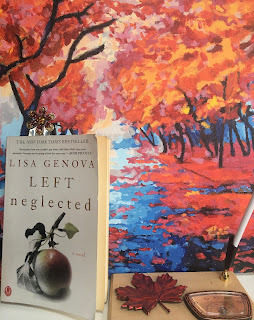Tsara Shelton's Blog
September 17, 2025
Short Story: The Stain
It was a themed submission that inspired this story.
Medley, an International Literary Journal, was seeking submissions for their 10th issue and the theme was "Daag".
I didn't recognize the word but was intrigued when I read the theme description:
In a world obsessed with filters and flawlessness — where anything remotely "stained" is scrubbed out of view — we chose to lean into the very things most people hide.Picking “Daag” as our tenth issue’s theme felt like touching a bruise — delicate, risky, but deeply necessary.
'Daag', that literally translates to stain/tainted. "Daag" says the hyperventilating newsreader, "Daag" says the cautious mother. Of unease, Of play, Of shame as much of shamelessness, Of unkindness, Of the genocide.
"Daag". A scar, a mark. Marring the mundane beauty of the universal, these bruises bleed in paradox. They make us imperfect, and imperfection's a gift of the soul — the canvas for a painting. They are our frailest memories recalled with stubborn strength.
This issue is an attempt to protagonise, for once, these very scars the world prefers hidden beneath its woollen sleeves.
Within minutes a story began to emerge. Distracting me, drawing my attention to it, calling me to notice: sort of like a stain.
Below is that story.
Originally published via Medley | International Literary Journal
Click the link to read my story on their site (it is a fantastically unlittered site that allows for comfortable and easy reading) and while you are there I hope you will read other stories, essays, and poetry. And, if you are inclined, consider checking out the theme for their next issue and see if an idea of your own wants to manifest.
Thank you to Medley for offering a theme and sharing their audience.
the stain
It didn’tmatter that she willed herself not to, with almost every pass Ramona made bythe mirror she glanced toward that stain on her tooth.
Her smallson was asleep in her arms, and they were alone. She had taken her two older boysto the elementary school – grateful they had both been in a singing mood thatmorning rather than a complaining and hitting each other one – and upon arrivalhome (a two car garage that had been renovated into a two bedroom apartmentspace) had glanced in the rear-view to peek in the backseat where her almost two-year-old’scar seat faced backwards. Without being able to see him she couldn’t be sure whetherhe had fallen asleep on the drive, but he was being quiet, so she’d decided totake a moment to pluck her eyebrows using the same mirror.
Adjustingthe rear-view she was about to get her trusty tweezers from the tiny pocket inher purse when she was surprised to notice a light brown stain on one of hercanines. Not a big stain, but one she had never noticed before. Coffee? Almostcertainly.
Rather thanpluck, she decided to brush her teeth. Gathering her not quite sleeping babyfrom the back she headed inside.
As always,the quiet of her apartment when the children were at school unnerved her. Itwas impossible to drown out the silence, but she didn’t want to become one ofthose women who needed distraction, so she always allowed time for theadjustment rather than turn on music. The silence would slowly edge away whilesounds made themselves known. Electricity, traffic outside, birds in trees;these sounds and others could be attuned to if given the space.
Her smallson was falling asleep so rather than brush her teeth Ramona chose to pace andbounce her body, giving him the motion needed to fall into deep slumber. Butthere was a large mirror in the tiny bathroom, and it was drawing her to it.She easily paced from one bedroom to the other (she slept with the baby in oneroom and her school-age boys slept in the other) attempting to avoid glancingtoo often at the mirror in the bathroom between the two rooms.
Anyway, astain on her teeth was not a big deal. It was kind of cute, really. Light brown– like the skin on her second oldest son. Coffee was famous for staining teethand coffee was a gift she had been giving herself since the age of thirteen inher rush to be a grown-up. Coffee, the beverage of adults, hadn’t taken muchgetting used to for her – she’d tried to like it black in order to feel themost adult, but in the end she always needed a little cream to love it. Now, asa single mom with three sons, it was still the grown-up gift in her life and astain on her teeth might simply be a way of wearing that gift on the outside.
Now, if thestain had been a darker brown, like the skin on her oldest son, she might haveworried. Not that the colour isn’t beautiful – how many years has she spentwishing she had been born with such dark beautiful skin! – but a darker stainmight need attending to and she could not afford a dentist.
Her smallson’s body grew heavy, and Ramona recognized this phase of sleep. She lookeddown at his sweet face without changing the rhythm in her bounce. How handsomehe was! His pink cheeks, his soft sleeping skin, his toddler scented breath,his little lips with a finger to them, the copper tinted wisp of hair on hisround head. She kept moving but couldn’t stop herself from kissing him gently.
How strangeit was to have this pale child. How strange it was for it to be strange to havea pale child. Ramona herself was pale, yet this two-year-old– with skin thecolour of her own – seemed almost foreign. Her older sons were dark, her oldestespecially, looking much more like their biological father than like herself.They had his dark skin, and his hooked nose.
Of her theydidn’t seem to have anything. She did not seem to have stained them at all. Thoughthey were still young, only four and six, so there was time.
As Ramonaslowed her pace in order to prepare the babe in her arms for a transition tothe bed, she let herself explore this idea of staining her children.
It was truethat they did not look like her, but it was her that was making all thedecisions for them. She had decided for them that they didn’t need a dad, thather love would be enough to guide them. This whole business of needing fathershad seemed ridiculous to her. She and her sister hadn’t known their father, shehadn’t really noticed anybody’s fathers growing up, so how important could theybe? Her own mother had raised her and her sister on her own and their home hadbeen mostly wonderful. The three of them still had a good relationship, thoughthere were too many miles between them to spend a lot of time together, theywere still connected in a comfortable way.
Why wouldraising sons be different? “Boys need a father” people said to her. Why? Whydid people act like gender mattered so much? Love was love, and Ramona lovedher boys with every fiber of herself. She had loved them from the moment shewas old enough to imagine having them. Ramona had imagined being a mom for aslong as she could remember.
The fathersof her sons were nice enough guys, but they hadn’t wanted to commit.
Her firstromance, she’d been engaged to be married to the father of her oldest two sons,had been a constant game of, “one day, one day,” any time she tried to get anactual plan from him. He was never around, always away on business, and whenshe did visit his home, it was never unpacked. Like he lived his entire lifesaying, “one day, one day,” and so she’d said no more. If one day is not today,then we are not going to be a family. And when he’d tried to keep the game of“one day,” going, she had said no. You can see your sons, but not as mypartner. And so he had chosen not to see their sons.
His darkskin, his hooked nose, that’s all they had of him. His bloodline was unknown toher as well. He had an accent, he traveled around the world and spoke severallanguages, he said he’d been born in England and had family in India, but shedidn’t really know much. And even what he had told her, she’d suspected wereinvented tales.
Were thesedecisions she made for her sons, to raise them on her own, without a father,without knowing where their beautiful dark skin and features came from, a messshe herself was making? A stain they would later grow up to notice in a rear-view mirror?
Interestinglyit was Ramona’s more recent romantic relationship that had started herwondering about this.
She hadbeen happy on her own, grateful to have found the garage apartment with thenice couple who lived in the house and were able to do maintenance or offercoffee when Ramona was running low. She could not work because she had to stayhome with her children, but government assistance was just enough to live onand that’s all she needed. To live and be with her children.
It wasn’twhat she’d imagined before becoming a mom of course. The boys fought and mademesses and yelled at her and no matter how much love she tried to offer inresponse, they didn’t care. They needed discipline she wasn’t good at servingup and consistence she wasn’t good at maintaining and rules she wasn’t good at enforcing.She needed sleep, she needed cooking lessons, she needed gas money. It washard, but she was happy.
And thenshe met him. As she remembered him, the way he had been with her sons, the wayhe had seen her specifically and noticed the little things she did, she smiledand looked down at their child. He seemed foreign to her still, at two yearsold. He was so different from her other two. Not only in colour buttemperament. Quiet, always quiet.
He wasfully asleep now, deeply so, and Ramona bounced her body toward the bed sheshared with him so she could lay him down and get a better look at the stain onher tooth.
With himcradled in her arms she leaned expertly toward the bed and laid him softlydown. He was sweaty in the places he’d been laying on her, and she was too.Their sweat mingled, stained.
She satbeside him and gently rubbed his back as he pulled his finger into that littlemouth and nibbled gently. His father had been pale, had had copper hair, hadnibbled on her fingers gently.
Ramonathinks she had loved him, and that he was the only man she had loved. Shethought she had loved the older boy’s dad, but that had been more of apractical thing. He was there, he said he was offering her marriage and afamily, they were nice to each other, she wanted to be a mom. They had beentogether for several years. It made sense.
But withhim, things were different. Her heart skipped, her head reeled, her stomachfluttered. She had been working in the daycare at the therapy center where heworked.
For Ramonait was a temporary gig because the usual woman who worked there had broken herarm and needed six weeks off. It was a wild coincidence that she’d been able tostep into the role.
She hadbeen at a playground with her children when the boys made friends with a disabledgirl playing at the park. According to the girl’s mom, she had spina bifida. Apparently,it was the sort of thing that affected each person differently but in this casethe six-year-old could not use the bottom half of her body at all. She wasplayful and funny, and Ramona’s oldest son played with her for hours whileRamona chatted with the mother. As luck would have it her other son madefriends with a boy who was also at the park and the day turned out to be hoursof wonderful play. Those are the days parents of young kids live for.
The momRamona made friends with that day worked in a therapy center, one that had aday care for the children of therapists who work there. Which is why, when theusual worker broke her arm, Ramona was offered the position. One she tookhappily so long as she could bring her own children at no cost, which they –being desperate and it being temporary – agreed to.
It wasduring those six weeks that she met, fell in love with, and then lost him. Itwas during her late-night chats with him that she questioned her confidenceregarding not needing a man for her sons. Because he questioned it, but not inan offensive way. He questioned it with honest curiosity. He was a therapist atthe center who worked primarily with young men, and he felt one of the mostimportant things for them was a strong male role model. He called the boyswithout fathers “strays” and even recommended Ramona watch a movie of that nameto back up his reasoning. They had these talks easily because during the daywhen the boys were awake, he clearly marveled at Ramona’s parenting. He watchedher with admiration and consistently noticed little lovely things she did.Things she hadn’t really noticed herself.
But whenthe six weeks ended and Ramona no longer worked there, he wouldn’t answer hercalls. It was strange. She had felt such love from him, and then nothing. Shecould have let it go but then soon she recognized that she was pregnant and itbecame important to her to let him know. Hopefully, also, to find out whathappened. What had scared him away.
She went tothe therapy center and waited for him to get off of work, her boys playing wildin the car. They loved playing in there, unbuckled.
When he sawher car in the parking lot, he stopped. Ramona saw that stop, and saw the unhappinesson his face; she couldn’t believe how hard it was to hold back tears. Ramonawas not a romantic person, but she was a person. And he clearly did not want tosee her.
She toldhim about the baby. He told her about his wife. She was without words. Nothingcame to her mouth or mind. He told her he was sorry, but he wouldn’t be able totake part in parenting. She told him he knew where to find her. With a stain onher heart, she left.
Again, shewas certain her sons did not need a father, they needed love, and she had thatto give. But had she stained them by making the decision to be fooled by thisman? To make a baby with him?
She softlykissed her small son on his small head and carefully got up from the bed andheaded into the bathroom. She looked at herself in the mirror and smiled. Thestain was not noticeable. She leaned a little closer to the mirror, stillsmiling, and tilted her head a little.
There itwas.
Lightbrown, probably coffee. Probably permanent.
She pickedup her toothbrush and dipped it into the homemade toothpaste (more sustainableto make it herself, financially and environmentally) and began the delightful choreof brushing. How anyone could not love brushing their teeth Ramona did notunderstand. Perhaps people with sensory issues, okay. But otherwise? What a wonderful feeling! To have the power tobrush yourself clean and healthy.
Sure, maybethere was a stain but only because there was life.
Life hadmess.
Some messesstained.
Hugs, smiles, and love!!Tsara Shelton (X.com)
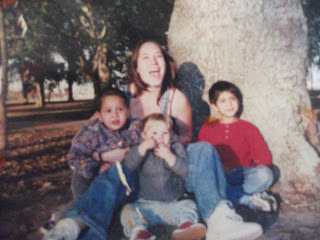
September 6, 2025
Autism Answer: International Autism Docuseries FIX IT IN FIVE: Israel - a review
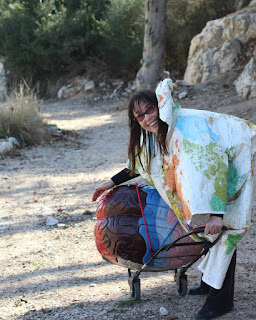 Lynette Louise holding her brain in Israel
Lynette Louise holding her brain in Israel
People are talking about Israel. Many are passionate and opinionated.
I’m certainmay of these people live in Israel or have spent a lot of time in that part ofthe world. I’m certain many know people who are living there.
I’m also certainmany of these people have no idea, no experience, no ties to the place, yet areinsistent on their opinions.
As parents,we’ve experienced this. As parents where there are uncommon challenges ordisabilities we have especiallyexperienced this.
This “peoplevoicing opinions about our situation” thing,
These arethings I’m thinking about after being given the gift that is season three ofFIX IT IN FIVE with THE BRAIN BROAD – the award winning international autism docuseries that originallyaired on The Autism Channel.
What ajourney!
In seasonthree we travel with Lynette Louise (The Brain Broad) and her crew to Israel.
One of thegreat pleasures in this show is the travel.
Season one –Kampala, Uganda
Season two –San Francisco, USA
Season three– Bet Shemesh, Israel
FIX IT INFIVE is a special style of travel series because the show is ultimately abouthelping families with at least one member who is on the autism spectrum, who also has at least one other co-occurring challenge; it is a show about behavior and bioplay techniques that create positive changes regardless ofculture or economic position. About the brain science that remains true and malleableregardless of religion or family history.
Hence, weare invited into a family home for five days. We are privy to intimate fearsand hopes as well as daily routines. Traveling this way feels more real, more authentic,more like actually being in the place.
So, it wasextra interesting to me, a person who has never been anywhere in or around Israel,to have access to the third season. To spend time with Shmuel and his big,beautiful family in their small apartment home.
It does nottake long to adore this family. The first episode (released and available on YouTube) is a two-part episode, but we are captivated long before we’ve evenbegun to feel fully settled in our seats.
Shmuel is athirteen-year-old autistic boy with an energy that lights up the screen, and helikes being on screen! His thrill at getting to know Lynette, and her joy ingetting to know him, is a delight to witness. At the same time the love andstruggles of mom and dad – both of whom are impressively candid andsignificantly different from each other – reaches into our hearts, validating ourown experiences while teaching us to understand new ones.
As a fullfledged #FixitinFiver myself, I was not surprised by how easy it was to fall inlove with this family. It has happened every season. I was a little surprised,however, to notice how different it felt having a dad on the show. Seasons oneand two were single-mom homes, but season three is a two-parent family with sixkids. I freaking loved it! The addition of dad, who struggles with suchdifferent things than mom, brings an energy that wasn’t present in previousseasons.
It alsobrought a new style of questions and answers.
The lessonsthat Lynette teaches the family, and us as an audience, are presented a littledifferently in this season, which was unexpectedly wonderful. Unexpectedbecause I already loved the way the lessons were taught in the previousseasons, but the change was refreshing.
Becauseboth mom and dad are teachers, the lessons on behavior, brain science, and bioplay,are presented in a more familiar for learning style. It’s not drasticallydifferent, but it’s different.
Shmuel andhis family practice responding differently to each other rather than scripting, in order to practicethinking differently and fostering a more real connection. They consider the conceptof practicing social skills over academic learning. They are introduced toconcepts that challenge traditions without disrespecting them. They adjust their behavioral environment.
Environmentis everything. We learn this brilliantly in every season of FIX IT IN FIVE.
Our environmentis made of many factors. Some we can control, others we cannot. This is the beautyof what we learn with Lynette in this international series. We learn it and wewatch it. We see, by being there in the home with Lynette and each family, howthe consistent concepts are adjusted to suit different needs and desires;different challenges and goals.
Ultimately,this is a powerful way to grasp the core concepts in Lynette’s teachings.
Everyone isdifferent - every family, every individual, every environment.
The people and places change;the core lessons stay the same.
Please, ifyou have any interest in autism, parenting, and/or Israel, watch season threeof FIX IT IN FIVE with THE BRAIN BROAD. Episode one is available now and a new episode will be released on YouTube each Monday in Sept 2025.
I won’tpretend watching will give you the right opinions to have about Israel or specialneeds parenting (wouldn’t it be neat if there was such a thing) but you will bemore informed; less ignorant.
Along theway you will also be entertained, educated, and inspired.
Hugs, smiles, and love!Tsara Shelton (X.com) FIX IT IN FIVE with LYNETTE LOUISE aka THE BRAIN BROADSeaason Three: IsraelApril 30, 2025
Autism Answer: Autistic Communication - a conversation
Originally published in The Loop
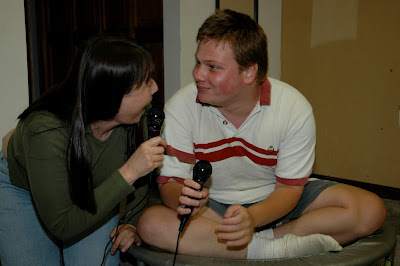 Mom & Dar
Mom & DarCommunication The exchange of thoughts, messages, or information, as by speech, signals, writing, or behavior.
My mom has been teaching the value of believing in, listening to, and raising the bar for people my entire life. I am the oldest of her eight children and admit, it didn't come natural to me, this believing beyond appearances thing.
But in our home we were not allowed to ignore ideas that might uncage people. Specifically, in my youth, my brothers.
So I pretended. I pretended I believed my four adopted brothers were as capable and "like us" as my mom clearly wanted them to be. I pretended, but with mom's consistent guidance it wasn't too long before pretending shifted. Not only for me, but for my brothers and others as well.
My brother, Dar, who is most severely impacted by autism, was the most challenging for most of us to recognize as relatable. Sure, he was handsome, but the jumping, rocking, stimming - none of it seemed to be for reasons anyone could fathom.
And goodness knew he wasn't telling us.
Or, was he?
Mom insisted he was. She listened to his habits, his sounds, his reactions, his motions... she listened with her eyes, her touch, her ears, her heart. She asked him to speak, to type, to show us what he wanted to say...
Years and years of this, and as a family we all grew to understand Dar better. His speech, though, we understand least of all. Mom understands the words he says better than anyone else, yet still she mostly misunderstands or invents based on likelihoods.
As a brain and behavior expert who works with families all around the world, mom says this is common. This misunderstanding and assuming the words of our loved ones with speech issues.
There is so much value in knowing the speaker who is hard to understand is saying something, is worth working to hear and help. Just that belief alone makes a difference and can help us hear each other better.
But more is needed. We want more than what the belief can do - we want to move into solutions that take us farther.
Mom and Dar are working on that.
In the meantime, please enjoy the short video below of my brother, Dar, answering mom's questions with patience while mom misunderstands a lot. It was only during the playback that mom realized what Dar had actually been saying and Dar was able to confirm. (the captions are for those of us who are unsure of his words)
As we close out Autism Awareness Month, I encourage you to enjoy all the videos in my mom's Autism On The Road series.
As my mom and brother live a nomadic lifestyle (in their RV, in hotels, invited to stay with family and friends around the world - from California to Montreal to Texas to Paris to Lebanon to Manitoba... a few months from now they'll be in Australia) their intentions have been largely to teach and to learn. As an autistic man my brother tends to inspire questions and reactions, which he and mom like to address with comfort, clarity, and kindness.
Also, as an autistic man living in a variety of spaces, my brother necessarily needs and wants to learn new environmental skills. Food, toilets, and other expectations and availabilities shift and change, often drastically. By spending the time closely with mom, they learn how to handle these things together.
Lately, a big focus has been on communication. Communication of all sorts but, in particular, Dar is focusing on speech. When he watches the videos he's surprised by how unclear his language is.When mom watches them, she's surprised by how much of his language she had misunderstood.
Together they watch them and Dar helps mom understand. Captions are added and the videos are shared.
They are the most recent (and shortest) videos on the Autism On The Road Playlist, and I recommend them. Of course, I also recommend the entire series!
Follow this link to view the playlist: Autism On The Road
Hugs, smiles, and love!! Tsara Shelton (X.com)March 13, 2025
Autism Answer: A Book For The Leader You Are (willingly or not)
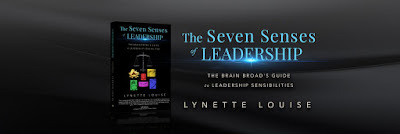 The Seven Senses of Leadership by Lynette Louise
The Seven Senses of Leadership by Lynette LouiseYou are in a Leadership position. Regardless of whether or not you've done this purposefully, you are. Not always, not everywhere maybe, but sometimes and in certain places, you are. I offer you my congratulations and my condolences, whichever you feel are warranted. ;D Now, obviously I can't help you get more or less Leadership responsibilities, but I can point you to a book that will help you always take on the role with purpose and even pride. This book will also help you choose your Leaders with deeper knowledge and intention. The Leadership we offer and the Leadership we choose is kind of a big deal, whether or not we decide to engage with it vigorously. The older I get (I'm finally 50!) the clearer it becomes that this stuff will not only affect me - whether I want it to or not - but it will affect my children, grandchildren (at the moment I have 5 of them!), great-grandchildren, etc. I'm not talking about political Leaders, but I'm not not talking about them either. They have so much power! But they are born out of and influenced by all the Leadership that surrounds us. Parents, educators, caregivers, friends, writers, creators, on and on and on. The way we step up, the choices we make as learners, purchasers, parents, teachers, content publishers, creators, voters, we are all in positions of power.
Unfortunately the publishing company that originally released my mom's book The Seven Senses of Leadership has disappeared and the paperback is no longer available through them. Fortunately, my mom asked me to help her release the title as an eBook via Amazon Kindle - and though I confess the formatting is still less than stellar it is now available! The book is phenomenal. It is short, smart, compassionate, inclusive, and often times funny. If you are able, please read and review: The Seven Senses of Leadership: The Brain Broad's Guide to Leadership Sensibilities
"What you believe changes what you see. [...] If you want to control how you see the world, this is good news because you can do one of two things: You can change your physiology or you can change your psychology. Both are possible and either one will change the other." ~Dr. Lynette Louise ("The Brain Broad"), The Seven Senses of LeadershipAdditionally: My mom will be speaking again at the Annual Leadership Summit America in Albany, New York - March 20 - 21 2025. The summit features top-tier speakers and offers attendees the chance to network and grow their leadership skills in an immersive environment. Follow this link to learn more: Internationally Renowned Brain Expert Lynette Louise, The Brain Broad, to Speak at Leadership Summit America Our world is wonderful. But it is made more wonderful when people Lead well. When people choose their Leaders well. When people are aware and purposeful in their Leadership relationships. Whether by reading the book, attending the summit, or both, there are excellent tools to reach for! Hugs, smiles, and love!!! Tsara Shelton (X.com)
January 17, 2025
Autism Answer: Nonverbal Communication and Telepathy
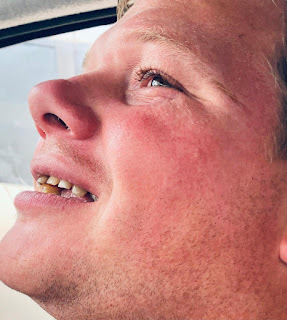 My brother, Dar
My brother, DarI originally wrote a version of this piece for my mom's newsletter, The Loop!
______________________________________________
"Nonverbal communication is the transmission of messages or signals through a nonverbal platform such as eye contact, body language, social distance, touch, voice, physical environments/appearance, and use of objects."
Telepathy is not on that list of examples, but it does say "such as" which implies the list is incomplete. Perhaps we can expect more examples to be told to us directly, in our thoughts. Telepathy-like.
If you have not yet been informed of the popular podcast and upcoming documentary The Telepathy Tapes , then my comment may seem rather unexpected. (I did try to warn you with telepathy that I was going to bring this up, but perhaps my aim was off?)
From their website: The Telepathy Tapes dares to explore the profound abilities of non-speakers with autism. These silent communicators possess gifts that defy conventional understanding, from telepathy to otherworldly perceptions, challenging the limits of what we believe to be real.
From me: I remember my mom (international brain change & behavior expert Lynette Louise, "The Brain Broad") telling us kids about a variety of times our autistic brother, Dar, and our mom communicated in this way.
In fact, at 36 minutes into the documentary The Indigo Evolution (click this link to watch on YouTube) mom shares a story about Dar telling her telepathically not to have an affair. (The story is funny but, as is mom's style, it is also deeply insightful and thought provoking... while being funny.)
People who spend time with autistics (or indigo children or similarly labeled individuals) are inclined to notice the unexpected and seemingly magical habit many of them have for feeling the energy and judgements in a room full of people; of making sudden and aware eye contact in answer to a thought in the mind of a parent or sibling; of laughing at a joke someone in the room is only thinking about telling; of projecting, or pushing, words into the minds of caregivers.
This is too common to be ignored.
Exploring the communication of telepathy is wonderful, and I have experienced it myself. My mom and I shared dreams a few times when I was little, before I learned not to believe in it. I suppose we may have shared dreams after that as well, but by then I chose to presume coincidence or consider it crazy.
Knowing that our non-speaking brothers and sisters do have things to say, things that are unique to them and their perspectives, is oh so necessary. Exploring the variety of ways in which they express themselves and choose to communicate with us is what it is to care, and to do science.
However, we must be careful! We must avoid magical thinking - ooohhh, they have special powers and are beyond us!
And we mustn't turn the story into one that denies disability.
All too often a fight for acceptance trips over into a fight to indulge our instabilities or disabilities.
When one sense is lessened we often enhance another. This we know. But it's not like the superpowers we see in film and comic books, and I think we know this too.
When my mom first adopted our autistic brother, Dar, my little sister and I watched the movie The Boy Who Could Fly with fascination. The boy in the film is autistic (a term we had never heard before mom adopted Dar) and though the boy did not talk, it turned out he could fly. So, our new brother must also be able to fly! We waited, we asked him, we closed our eyes and told him to do it while we weren't looking. Eventually, disappointed and disillusioned, we came to realize that our brother was not going to fly. We gave up asking him. In fact, for a while, we sort of gave up on him. Our poor brother. He probably wanted to fly away from our disappointed attitudes.
Our dear brother. His lifelong quest of attempting clear communication has been fraught with challenges. When he was still in school and practicing facilitated communication, his ability to push words into mom's mind, but not often the mind's of others, was initially frustrating and eventually dangerous, causing a few terrible situations. One leading to a painful court case. She explores all of this in candid detail in her phenomenal book Miracles are Made: A Real Life Guide to Autism (published 2011).
Neither mom nor I have yet listened to The Telepathy Tapes, but we both appreciate their relevance. My mom more so. Not only because of her own experiences but because of the conversations and challenges she sees in homes around the world. For more than forty years my mom has been discussing this phenomenon with families from every culture, economic background, and belief system. It is not an uncommon issue and it deserves to be explored. Carefully.
If autistics can communicate using more of their senses, it follows that most of us have the potential to do so as well.Whether it is telepathy or other advanced skills of nonverbal communication it is worth our attention.
The power this science can have to guide - or misguide - us as a community is clear.
Not the science itself so much as how we handle it.
Let's handle with care.
Hugs, smiles, and love!
January 7, 2025
Book Review: The Way of Men by Jack Donovan
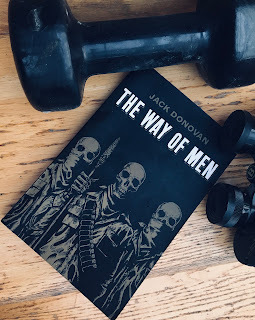
Even before I became a mother to boys, I was unexplainably curious about what it meant to be a good man. No, that's not quite right. I was curious about what it meant to try to be a good man, to contemplate it and to make choices in pursuit of it, to wrestle with those questions as boys becoming men.
I don't know why I was so interested in the quest for manhood. I was (and am) a girl. A girl who was (and is) quite happy being a girl. More than happy since my ultimate dream has always been to be a mom.
Eventually I become a mother. And as luck would have it, I am the mother of four boys. Boys who have (and still do) wrestle with the questions of manhood.
My interest in the subject of being a good man, and being good at being a man, obviously increased.
This book then, The Way of Men, hits that nail on the head.
That's not to say I considered it the answer to my questions, but certainly it explored the theme and explored it well.
In the preface the author, Jack Donovan, claims the book is his answer to the question: "What is masculinity?"
I think the book does a good job of examining that question. It is straight forward, thought provoking, ballsy, interesting, often funny, and powerful. It offered ideas I don't think I would have imagined on my own.
By stripping away much of the mess we make in creating civilization Jack Donovan boils things down to their basic elements; to the core of men and the nature of them. I appreciate that he doesn't stop there, though. He admits that he likes - believes in - an element of civilizing and ease of living. He believes in seeking a healthy balance, for the sake of men and masculinity. He explores civilizations and the dangers they often present to The Way of Men; he also offers suggestions and warns us of the harm in not making necessary shifts.
I like, too, that he separates the ideas of "Being a Good Man" and "Being Good at Being a Man". Throughout my life I have been curious about the plight of being a good man, but it hadn't occurred to me that being a good man and being good at being a man could be two different things. By looking at them separately, I felt invigorated and armed with a clearer way of understanding people.
The Way of Men came to several conclusions I for sure don't agree with (and a few I was devastated by) but it also laid out some well constructed concepts I think are important.
This isn't a book I'm compelled to run around recommending but I wouldn't avoid suggesting it either.
If it calls to you and you do read it, I recommend reading it with a willingness to consider the ideas presented without prejudice, while also remembering to examine them as ideas, not ultimate truths.
So much of this book is of value. All of it is of interest and valid. And even though I strongly want to push back on a fair bit of it I also can't deny the necessity of considering it as a whole.
Part of me wishes I had read it when my sons were still small, but part of me is glad I didn't. I'm not confident that the me I was back then would have been aware of the aspects I think need to be reconsidered, re-imagined, or simply thrown out.
Of course, the me I am going to be several years from now will probably have such different things to think about everything, including this book.
Oh, life. How you unceasingly seem to evolve me.
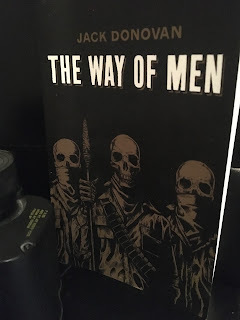
Thank you for offering me literature that helps me influence that evolution. (Such is The Way of Reading).
December 31, 2024
Autism Answer: Linger Longer
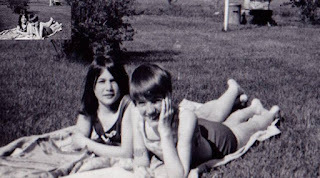 My mom (long hair) and her friend Conni (short hair) laying on a towel in the grass when they were twelve years old
My mom (long hair) and her friend Conni (short hair) laying on a towel in the grass when they were twelve years oldWhen I was a little girl I used to look deep and long at photos of my mom when she was a little girl. I would focus, unfocus, refocus my eyes, will myself to fall into it; into my mom before she was a woman.
The woman I looked up at with all the love in the world had been a little girl; was still a little girl in those photos. A little girl, like me.
But not me.
How? How was my mom once a girl? What did that mean?
I wanted wanted wanted to know her thoughts, her experiences, her dreams. I tried to imagine them, but it was tainted, wrong, it was me imagining. I wanted to KNOW. I'd ask her, and lucky for me my mom was the sort of woman who would answer these probing questions from her daughter. And I was confident she was answering honestly. But they were the answers of a woman, shared with a girl who was not her, and I knew that fell far short from knowing.
I'd try again. Bringing mom's imperfect answers with me I'd fall into the eyes of the girl in the photo, try to disappear most of the girl that was me - hold onto only enough of me to remember what it was I was seeking from the image of my mom as she was, which was a moment of my mom as she became...
This is what it can be to look at and imagine. To take our time, think, wonder. Linger. Linger longer. I was not the only one doing it, I'm sure.
Lately, though, I notice so many people looking merely for seemingly superficial purposes. Quick successive jolts of image inducing reactions, it seems like? Perhaps for the jolt of chemicals our brains release when seeing something beautiful, shocking, sexy, rage inducing.
I see people look quickly, move on; seek more.
There is less moving within, moving along, allowing more, thinking and wondering and exploring the images; going where they take us, thinking about things along the way. People still linger, but it seems they stay only until the initial jolt of emotion has waned and then they move on for more of that, more closely related to the jolt. Reading and leaving comments is too often a way to stay jolted, it is not often enough a type of deeper exploration.
It is entirely human to engage in emotion through our senses. I think this is what I was doing as a little girl desiring to know my mom as she was; to feel myself be known by her as well. Yes, I think I was doing that too. Wanting the little girl that was my mom to know the little girl that was me.
But I worry that without the longer linger, without the deeper explorations and thoughts, the adjusting of ourselves along the way, the noticing of our thoughts and the recognition of our limitations, we are merely addicts. Brain-chemical junkies.
Not all of us have vision, or are able to use sight in this way, but those of us who are able might want to consider lingering longer. Listening to what we are thinking, and exploring why we are thinking it. Teasing out the motivations - our own, the image sharers - and allowing the chemicals to run their course before we seek the next hit.
We are relentlessly exposed to images intended to make us want, hunger, hate.
Images intended to make us smile, laugh, feel peace.
These images on their own can also encourage us to think. But if we do not linger long enough, they simply encourage an addiction to more images giving us a feeling.
A feeling that is our own, yet we are too easily allowing outside images to do the job of jump-starting our emotions. Of corralling them.
I like the idea of lingering longer.
Of exploring what my inside is telling me - not only from the first jolt but on into the day. To allow thinking and exploring to be organically my own, not overly influenced, though admittedly influenced.
I like influence, I like sharing, I like learning from outside of me.
I like seeing my mom as a girl, looking into her eyes and asking what she sees and how she hopes to be seen.
We are what we consume and those of us with sight are obligated to consume images.
When we linger longer we can find time to include the nutrition our capacity to think, care, and understand truly requires. To exercise those muscles; that skill.
Happy New Year friends!
I hope you'll linger longer with me!(Even though I used the word exercise. tee hee!)Hugs, smiles, and love!! Autism Answers with Tsara Shelton (X.com)
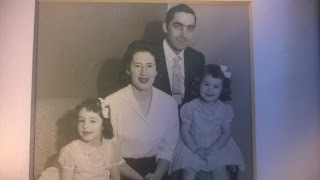 Family portrait: my aunt Delmarie, my grandma, my grandpa, my mom (left to right)
Family portrait: my aunt Delmarie, my grandma, my grandpa, my mom (left to right)
November 4, 2024
Autism Answer: Heavenly Home and the Words we use to Describe it
I originally wrote this piece for my column on Disabled World. I am sharing it here with permission.
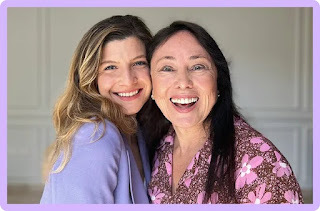 Louloua Smadi and Lynette Louise
Louloua Smadi and Lynette Louise
A few years ago I was taking minutes in an important business meeting for All Brains Grow….
Okay, I will be honest with you. I wasn’t taking minutes exactly; I was taking notes. I wrote “taking minutes” because that asks you to picture me in a specific role; one where I am professional and potentially necessary, but not overly responsible for what is said or done. Taking minutes in a meeting is a requirement of many businesses, whereas taking notes is less professional sounding but a good idea.
In the meeting I was encouraged to be engaged, to include my thoughts and opinions, to recognize areas that were not being addressed or were hard to understand. Mostly, though, during those beginning meetings between Lynette Louise, Louloua Smadi and their team, my action was to take notes while they designed a website and online course meant to share the behavior, bio-play, and neuroplasticity knowledge they teach to families and schools around the globe. Responding techniques and brain science that effectively helps people with special needs and/or traumatized brains. All Brains Grow and they want to share with as many people as they can how to grow them with intention, confidence, and expertise.
I am Lynette’s daughter and personal assistant. I have been her daughter since my birth (unlike several of my siblings who came along at older, sometimes even teen, ages) and her personal assistant fairly consistently since my teen years.
Louloua is not my sibling, and though I feel sometimes like she is I am kind of glad she isn’t. If she were, I might have to be jealous. She is beautiful, multilingual, holistically intelligent, and ever so empathetic. More than that, she is enthusiastic about taking up the torch and partnering with mom while I am enthusiastic about being less hands on and more of a sideline cheerleader. I am not being self-depreciating, I do see my value from the sidelines, but I am also aware that my unwillingness to be in the hands-on position leaves me in a more comfortable less vulnerable space. Hence, I might be a little bit jealous of Louloua if she was my sister. (I recognize this because I am a little bit jealous of Brandessa, my hands-on leadership sister. I am also her enthusiastic cheer leader.)
Being invited to take notes and offer ideas to the All Brains Grow team as they began building an online course for parents around the world, using their combined experience and expertise, their delightfully different styles and cultures, I was full of gratitude.
As neuroplasticians, play therapists, moms, siblings, and individuals these women are aware and experienced in the art of caring about special needs and learning disabilities. They focus on environments and families. Never on a broken child. A broken person.
They teach the science and skills of neurofeedback and bio-play.
Bio-play takes the science of biofeedback, the learning enhancement of play, and the knowledge of everyday living, and brings it together into a lifestyle of easy living while learning.
They are gifted at giving parents and caregivers the understanding and information necessary to become experts in the lives of their children and the home they are building. As I said years ago in my notes: Making bio-play effortless so time at home is easy and everyone grows smarter and healthier. Heaven at home.
And now, Heavenly Home is the name of the course.
And it is names I want most to mention here.
Due to their combined years of making change happen in lives that were desperate for it, making miracles happen with behavior science and persistence, knowing what needed to be taught and exampled in the course they were building wasn’t as hard to hash out as knowing what words to use in their lessons and literature.
And this is the thing: they work and live in different places around the world, languages change and people they work with most often struggle with communication, yet people are easily emotionally charged and ready to react unnecessarily strongly to word choices.
It is not the opinion of thinking people that we should not discuss the power our language has. Indeed, Lynette and Louloua are wonderful at pointing out how the language you use in your home will indicate deeper meaning and influence behaviors. However, whether you use terms like special needs, learning disabled, autistic, brain dysfunction, or neurodiverse, does not mean you are more or less “right” but more likely means you have adopted language based on what you hear and see around you. The names and words we use are worth examining. They are always worth considering, and changes in the way we speak of and to each other do make changes in the way we see ourselves and each other, leading to changes in our ability to gain skills and grow healthy.
But arguing about the words is not the point: considering them is. As I took notes that day, I listened to the women consider and care about the language. Not to pander or push back but as a result of how much they consider and care about people.
This is the part we want to hold onto and take the strongest action on: the people we are talking with while we use our words. The people are the point, the words are our attempt to connect.
Those conversations and my notes are a few years old now. Since then there has been much filming, transcribing, consulting, and teaching. All Brains Grow is now a website with an online course for parents and caregivers of people with special needs that is being utilized by parents around the world. It is a beautiful way to use technology in order to help families in their homes, in the space they spend most of their time and where intentional informed responding most needs to happen.
Heavenly Homes is about creating a heaven at home by knowing what to do to help your family grow healthier and more skilled. Happier.
Heaven at home is knowing when to give attention and when not to give attention, knowing when (and what) to play and when not to play, knowing when to punish and when not to punish; knowing when to be scheduled and strict and when to be free and spontaneous. Heaven at home is being armed with knowledge so you can be a quick effective responder.
The name of the course is Heavenly Home. Heaven is used because that is the feeling they want to create, the feeling the word evokes. It would not be impossible for people to choose to be angry at the heaven inference. They could decide it is blasphemous. Or they could infer that there is religion involved and choose to avoid it. Even scoff at it.
But Heavenly Home got its name on that day I was taking notes when the team talked passionately about wanting to help families create a space at home that was wonderful. Where they knew how to encourage growth, acceptance, and skill acquisition and be their own experts. Where they would know what to do when challenges presented themselves.
Knowing what to do is a heavenly gift.
However you choose to say it.
August 19, 2024
Autism Answer: Shoes - an Invention.
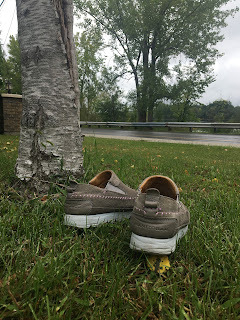
Like a slightly cool tickle on my skin, that's how the early morning breeze felt. Summer's second half in Quebec offers the mornings I missed so deeply when living in Texas. Wearing a t-shirt and shorts I stood on our driveway, facing out toward the river across the street. I am not a particularly visual person, but it is a wonderful view. I focused on the feeling of my hands wrapped around my mug of coffee. It is a little warm, but more than that it conjures up an image of myself as a woman. In my youth I pictured a woman in nature, sipping coffee and contemplating the world slowly, as the iconic woman. The woman to aim toward becoming. By focusing on my hands, I was that woman. Next, I stepped my bare feet off of our concrete driveway and slipped them onto the grass of our lawn. The first thing I felt was the coolness, quickly followed by wet. The dew is delightful and refreshing on my feet. It feels like camping. The pleasure I take in each sensation is remarkable; you might think I don't do this most mornings. But I do. The pleasure does not fade. The thoughts that tumble through my mind are rarely brilliant, sensational, or earth shattering. But they are lovely. Informed by the environment and the sensations, my delight in the feeling of feet on cool wet grass this morning led me to think about shoes as an invention. As I moved around on the grass, under the maple tree and then away from it, sipping my lukewarm coffee and being that iconic woman, I imagined people ever so long ago moving about in bare feet and knowing no other way. Their feet would have been different from mine, and the sensations would have been different as well. There is something healthy about bare feet. But they also would have gotten deep cuts that lead to infections. They would have been unable to inhabit certain spaces or move as quickly in them. They would have been frostbitten. Their bare feet would have been much stronger than mine, but still bare. As foot coverings were invented they would have been celebrated, I'm guessing, by many. Also, I imagine, they would have been scoffed at. The feeling might have been weird and unyielding, and the disconnect from the earth might have felt unfamiliar and awkward. But the perks of protecting feet are very real. Life saving. And the ability to more easily go where we once struggled to go is always appealing. And then from simply covering our feet to creating shoes. I imagined two long ago cavemen as I moved from the grass back to the concrete pavers of our driveway where I enjoyed the rough texture and tiny runaway rocks - the grit - under my feet. I imagined these men discussing, with invisible to me communication, the invention of these shoes. One was adamantly against it. They made us less connected to the earth, they made our feet too soft and sensitive, they made people move into places on the planet not meant for us where we proceeded to beat it into submission, to renovate it for our own purposes. This would not be good, he communicated with grunts and motions and invisible understandings, for the way of life. His companion was declaring the ridiculousness of resisting progress. Nay, the cruelty of it. These shoes save lives. Not only by protecting feet but also by granting them the ability to move farther, beyond previous limits. Imagine the food they could forage! The food they could hunt! We had not been granted such thick paws or hooves like other animals, but we can make them. Make something better even. As I imagined, I moved around again. Back I went to our lawn, bare feet on wet grass, the grass relieving me of the tiny pebbles that were sticking to the skin of my soles. The morning was beginning to pick up and a few cars passed by. There is a small road, as well as a bike path, between our lawn and the river. I like it. I sipped my coffee and imagined those cavemen recognizing that they were both right. I moved back under the maple tree to step up onto the wooden bench placed beneath it, granting me a neat feeling of being a little taller (standing on a bench) and also a little hidden (in the leaves of the maple tree). I imagined them sitting on boulders and wearing traditional caveman garb (I've seen the Flintstones so I know the style of the times.) while continuing to debate the various issues of their topic. Shoes. My bare feet were planted firmly on the bench, the skin of my legs and arms pleasantly tickled by the breeze, the sound of the leaves dancing in the tree above me, rustling, invited my lips to curl upward as I closed my eyes and tuned in. How I adore that sound!
I imagined these cavemen knowing that shoes were not a bad invention, they did not disagree on that, but they could not agree on what was more important - limiting certain things or forging forcefully forward. As I stood on that bench in my bare feet, loving the option to walk this way in our grass, I noticed the cars becoming a little more frequent. I tried to sip my coffee and noticed there was no more to sip. I recognized it was time to head indoors and drive my step-daughter to her bus stop. Whispering a quiet imaginary goodby to my imaginary caveman friends I made my way into our large home with a pool, a solarium, five bathrooms (one ever so fancily outside by the pool), and climbed comfortably with my step-daughter into our 2016 SUV where she paused her tik toks (but did not remove her Bluetooth headphones) in order to chit chat with me while we drove through the light traffic, past a plethora of homes in a variety of sizes and styles, careful not to hit the many squirrels that like to fritter from tree to tree despite any roads between them, to her bus terminus. This I did happily and comfortably. But guess what? I chose not to wear any shoes. Hugs, smiles, and love!!!Tsara Shelton (X.com)
July 22, 2024
Book Review: Left Neglected by Lisa Genova
Book: Left Neglected
Author: Lisa Genova
Publish date: July 2011
Paperback Pages: 352
I didn’tthink my mom was lying exactly. It’s just – I don’t know, I couldn’t fathom it.I mean, she couldn’t see anything on her left? Only on her left?
My mom’sleft hemisphere neglect – the result of an injury to the right hemisphere ofher brain (she hit her head hard while working in Paris) - was short lived andminimally disabling, in part because mom is a brain and behavior expert withthe skills, tools, and knowledge of how to help herself immediately.1 Due to my mom’s ability to turn things aroundand make good use of them, it became like so many things happening to my mom:something that makes her seem weird while giving her a deeper knowledge andunderstanding of brain and behavior.
However,for so many others (including Sarah, the main character in Left Neglected)it is far more life changing and challenging.
LeftNeglected is thesecond novel by Lisa Genova, author of Still Alice. Both books center onsuper successful women who are compelled to re-frame their own versions ofsuccess when confronted with neurological dysfunctions.
In StillAlice, the dysfunction is early-onset Alzheimer’s disease.
For Sarahin Left Neglected it is left neglect, an arguably less famous but stillsignificant condition.
The novelbegins by dropping readers into the non-stop chaos of Sarah’s home and worklife. Both Sarah and her husband, Bob, are competitive high achievers. Theyhave three adorable children (I fell in love with them instantly!) and theiroldest – a first grader – is struggling both at school and at home to followdirections and complete assignments. With both parents working all hours andpaying for two homes they are blessed to also have the help of atwenty-two-year-old nanny, Abby. She lives ten minutes away, has a degree inpsychology, and adores the children.
The pace oftheir life, of the story, of Sarah’s inner dialogue, is go go go. There isalways something needing to be done, someone needing to be delegated to do it,and goals to keep an eye on. It is hurried, but not unhappy. The group workswell as a team and though they rarely take a moment to enjoy it, they areenjoying it. It fits into the dream they have for their lives.
However,Sarah is in an accident on her way to work and wakes up missing the entire leftside of her vision. She cannot see or attend to anything on her left. The speedwith which she moved through her life is no longer available to her.
It is hardto describe what it’s like to have left neglect. In Sarah’s experience (as inmy mom’s) she thinks she’s seeing everything. Everything appears whole to her,yet she is consistently unable to see, feel, or attend to the left. Forexample, she’ll finish eating all the food on her plate, be certain it is allgone, yet everything on the left remains. She is not seeing it, but she alsocannot recognize that she is not seeing it. Walking and dressing are nearlyimpossible at first because her left side does not exist for her. It isn’tparalyzed, it isn’t missing, it just isn’t.
In therapyshe practices focusing on moving, seeing, feeling, and being aware of the left.These descriptions are fascinating and hard to hold onto. As a reader I bothcould and could not quite understand. Which, of course, is true of trying tounderstand anything completely foreign to our experience.
As thestory goes on, now hindered by Sarah’s inability to see the left, we slow down.(Though Sarah does not do so easily! As in keeping with her character she plansto beat this thing; to impress everyone with her ability to win therapy.) Inslowing down we see new things. Sarah’s mom reenters her life and it is a turbulentreunion. Sarah has anger toward her mother for not being available to her asshe grew up. She struggles to allow her to be there for her now.
Sarah’s hardshipsinspire a new kind of connection with her oldest son, and together theydiscover creative ideas for their challenges with homework and reading.
Sarah’sinternal debates about being handicapped are candid. At first, she refuses toaccept herself as a disabled person. She feels certain that she can push andwork her way out.
Hence, asadaptations are presented, she wrestles with the question of whether it isgiving up to accept tools designed to assist her as a disabled person. Is itgiving up to snowboard with assistance when she really wants to ski without it?Will she become complacent? Will she stop insisting on healing?
Lucky forus she chooses to accept the opportunities offered by the (NEHSA)2 – a real organization – and we gosnowboarding. Sarah’s world becomes bigger.
With thisnew movement, this new momentum and adaptations, Sarah sees a new idea for adifferent life that might suit her and her family well.
The bookdoes a lovely (though not exactly subtle) job of reminding readers that many ofus are voluntarily neglecting entire aspects of our own lives, for a variety ofreasons in a variety of ways.
Because ofSarah’s brain trauma she gains a new beautiful relationship with her mom, shefinds time and meaningful ways to be with her children, she accepts employmentthat feels holistically fulfilling. She does not judge the life she was livingbefore, and indeed misses elements of it. However, by adapting she has alsocreated something more suitable and sustainable for her family.
It is anice reminder that we can be proud of who we were even when we choose to besomeone new, evolving and progressing does not have to include disliking ordisapproving of the past.
LeftNeglected is a goodbook with a lovely message: that left neglect is a real thing so maybe my momwasn’t making it up when she said she couldn’t see anything on the left.
(Hmmmm?Pardon me? I see, I’m being handed a note that tells me my mom was not, in fact,the moral of the story. I will rewrite that.)
LeftNeglected is a goodbook with a lovely message: that a single moment can derail everything you’rebecoming but if you do the work of adapting, if you do not neglect theopportunities and people around you, life can become a different yet equalsuccess.
1. If you are interested in my mom’swork as a brain and behavior expert, or simply curious about such a weird andwonderful mom of eight, you can visit her websites to see books, videos, and somuch more, here: www.lynettelouise.com / www.brainbody.net
2. To learn more about the New EnglandHandicapped Sports Association you can visit their website by following thislink: https://nehsa.org/
Hugs, smiles, and love!!Autism Answers with Tsara Shelton (Facebook)

